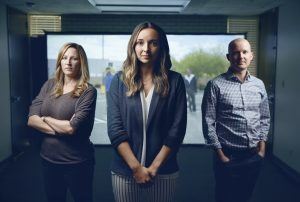
As a counselor in training, Rachel Paulk is trained to “walk in clients’ shoes,” with hope that consideration of one’s circumstances will yield more effective care and outcomes.
She’s practiced this empathic approach daily as a counselor for youth sex offenders at residential facilities in Alabama, working diligently during treatment to consider their prior trauma and home situations.
Relating to disadvantaged youth isn’t too far of a reach — after all, adults were once children. But when a client works in a dangerous job where split-second decisions can result in casualties, walking in a client’s shoes can be difficult.
Paulk, a Millbrook native and graduate student at The University of Alabama, has discovered this firsthand, working with West Alabama-area law enforcement on an innovative research project that measures officers’ responses in various “shoot/don’t shoot” scenarios.
Paulk has worked with Dr. Ryan Cook, assistant professor of educational studies, psychology, research methodology and counseling, and Dr. Diana Dolliver, associate professor of criminology and criminal justice, in conducting two-hour sessions with officers and gathering their responses and neural data during virtual interactions with civilians. Paulk also organized the system’s massive database of scenarios and variables, which has helped streamline data collection and reduce the amount of time officers — who are on the clock during participation — spend with researchers.
The researchers use VirTra, a police training simulator that uses a large single screen with more than 100 scenarios that police officers face while on the job, like traffic stops, domestic disputes and distress calls. Officers use firearms with air cartridges during the simulation and are graded based on their actions, reaction times and the desired outcome of each scenario.
“The results were pretty surprising,” Paulk said. “I couldn’t imagine having to make a split-second decision of whether or not to shoot. Being able to see what they actually encounter on a day-to-day basis, and how they put their lives on the line each day and how quickly things can escalate was eye-opening.
“Learning why, what and how on an important topic has been awesome.”
Paulk holds undergraduate degrees in psychology and criminal justice from UA and will earn a master’s degree in clinical mental health counseling in December. She’s applied to UA’s doctoral program in counselor education.
Learn more about the research by reading the full article on the UA news site.